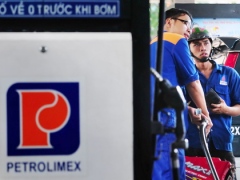Audit uncovers fuel wholesalers’ hefty profits

>> Ministries differ on state of fuel distributors
At the press conference held to publicise the audit results conducted on four major fuel wholesalers, Le Hoang Hai, deputy head of the Business Finance Agency under the Ministry of Finance, said that on August 26, when the gasoline retail price was cut by VND500 a liter, the finance ministry claimed that fuel wholesalers were operating with a gain.
In fact, audit results show that in the period between July 1 and August 26, Petrolimex enjoyed a profit of VND130 billion ($6.24 million), while the respective figures for Saigon Petro and Petimex are VND48 billion, and VND22 billion, Hai said.
“Therefore, the price cut imposed on August 26 was completely reasonable,” he concluded.
Hai elaborated that the wholesalers have gained profits from most of the fuel commodities.
Petrolimex, for instance, generated a VND202 profit on every liter of gasoline they sold, and VND365 on diesel.
Meanwhile, Saigon Petro reaped VND1,110 a liter for kerosene, and VND232 for A92 gasoline.
“These huge profits do not even include the fixed profit of VND300 a liter as stipulated by the Ministry of Finance on the wholesalers’ prime cost calculation,” Hai said.
“Since the wholesalers always lament their supposed losses, the finance ministry wants the public to know what their actual finance state is.”
Granting commissions exceeding limits
However, Hai added that in the first half of this year, the wholesalers have actually incurred losses from their fuel trading activities.
Specifically, Petrolimex suffered a VND1.31-trillion loss, Petimex, VND136 billion, Saigon Petro, VND7.5 billion, and PV Oil, VND382 billion.
However, the main cause for these losses is the fact that the wholesalers have granted commission for their dealers that are too high.
Deputy Minister Mai said that although there is no regulation on the specific commission rate wholesalers are allowed to pay their dealers, the Ministry of Finance has stipulated the “fixed” business expenses at VND600 in the fuel retail price calculation.
The expenses include the commission for dealers, but the audit has found that many wholesalers pay a commission exceeding that limit, Mai said.
“This is because the wholesalers are allowed to negotiate with their dealers on how high the commissions should be.”
Mai said Petrolimex has paid its dealers commissions worth VND210-830 a liter in the first six months of the year, resulting in an overrun of VND516 billion in business expenses. In the same period, dealers of Petimex received VND867 in commission for every liter of fuel they sold.
“While consumers have to suffer from high fuel retail prices, and the government has been putting in an effort to tame the high inflation, it is unreasonable for wholesalers to offer such high commissions,” Mai said.
“This occurs because there is no regulation specifying a limit rate for commissions.”
Mai demanded that such a commission limit be stipulated soon, since dealers of different wholesalers are facing unhealthy competition with each other due to the different commissions offered.
“There were instances in which a wholesaler paid its dealers only VND100 a liter, while dealers of another wholesaler received as much as VND1,000 a liter,” Mai said.
Transfer pricing suspected
The audit results show that while wholesalers suffered from losses, their dealers enjoyed hefty profits, which has raised skepticism among insiders about the former’s transfer pricing activity.
Hai said his unit had called on the Ministry of Finance to continue its inspection on wholesalers to clarify the issue.
Regarding the fuel prime cost calculation, which is made based on the average fuel import price in the previous 30 days, Mai said this lengthy period has prevented wholesalers from adjusting their prices in time with the global price fluctuation.
“The Ministry of Finance will petition the government to reduce the average period to around 10 days, in order to enable domestic prices to fluctuate in accordance with its global counterpart,” Mai said.
“The ministry will also demand the exclusion of the fixed profit from the prime cost calculation, in order to bring more transparency to the wholesaler’s financial status.”
What the stars mean:
★ Poor ★ ★ Promising ★★★ Good ★★★★ Very good ★★★★★ Exceptional
Related Contents
Latest News
More News
- State corporations poised to drive 2026 growth (February 03, 2026 | 13:58)
- Why high-tech talent will define Vietnam’s growth (February 02, 2026 | 10:47)
- FMCG resilience amid varying storms (February 02, 2026 | 10:00)
- Customs reforms strengthen business confidence, support trade growth (February 01, 2026 | 08:20)
- Vietnam and US to launch sixth trade negotiation round (January 30, 2026 | 15:19)
- Digital publishing emerges as key growth driver in Vietnam (January 30, 2026 | 10:59)
- EVN signs key contract for Tri An hydropower expansion (January 30, 2026 | 10:57)
- Vietnam to lead trade growth in ASEAN (January 29, 2026 | 15:08)
- Carlsberg Vietnam delivers Lunar New Year support in central region (January 28, 2026 | 17:19)
- TikTok penalised $35,000 in Vietnam for consumer protection violations (January 28, 2026 | 17:15)

 Tag:
Tag:



















 Mobile Version
Mobile Version